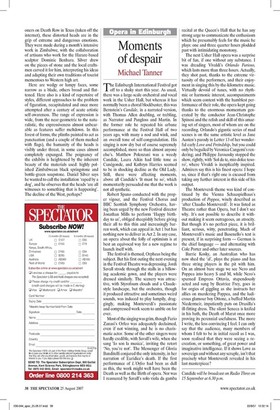Moments of despair
Michael Tanner rr he Edinburgh International Festival got off to a shaky start this year. As usual, there was a large-scale orchestral and vocal work in the Usher Hall, but whereas it has normally been a choral blockbuster, this was Bernstein's Candide, in a narrated version, with Thomas Allen doubling, or trebling, as Narrator and Pangloss and Martin. In the former role he repeated his urbane performance at the Festival Hall of two years ago, with many a nod and wink, and an overall tone of self-congratulation. His singing is now dry but of course supremely accomplished, more so than almost anyone else's. Matthew Polenzani was a weedy Candide, Laura Aikin had little tone as Cunegonde, and Kathryn Harries seemed to be in shocking decline as the Old Lady. Still, there were affecting moments, above all Candide's 'It must be so', which momentarily persuaded me that the work is not all synthetic.
Robert Spano conducted with the proper vigour, and the Festival Chorus and BBC Scottish Symphony Orchestra, having been urged by the new Festival director Jonathan Mills to perform 'Happy birthday to us', obliged sheepishly before giving their all to this thin and increasingly barren work, which can appeal in Act 1 but has nothing new to deliver in Act 2. In any case, an opera about the folly of optimism is at best an equivocal way for a new regime to launch itself with.
The festival is themed, Orpheus being the subject. But his first outing the next evening in the Festival Theatre was depressing. Jordi Savall strode through the stalls in a billowing academic gown, and the players were dressed similarly. The scenery was attractive, with Styrofoam clouds and a Claudestyle landscape, but the orchestra, though it produced attractive and sometimes weird sounds, was induced to play lumpily, draggingly, making Monteverdi's passionate and compressed work seem to amble on for ever.
Most of the singing was grim, though Furio Zanasi's Orfeo was adequately declaimed, even if not winning, and he is no charismatic actor. Some of the other singers were hardly credible, with Savall's wife, when she sang 'lo son la musica', inviting the retort 'No, you're not'. The Messenger of Gloria Banditelli conjured the only intensity, in her narration of Euridice's death. If the first performance of L'Orfeo had been as dull as this, the work might well have been the Death as well as the Birth of opera. Nor was I reassured by Savall's solo viola da gamba recital at the Queen's Hall that he has any strong urge to communicate the enthusiasm which he presumably feels for the music he plays: one and three quarter hours plodded past with intimidating monotony.
The next Usher Hall opera was a surprise bit of fun, if one without any substance. I was dreading Vivaldi's Orlando Furioso, which lasts more than three hours. Actually, they shot past, thanks to the extreme virtuosity of the performers, and their enjoyment in singing this by-the-kilometre music. Virtually devoid of tunes, with no rhythmic or harmonic interest, accompaniments which seem content with the humblest performance of their role, the opera kept going thanks to the enormous momentum generated by the conductor Jean-Christophe Spinosi and the relish and skill of this amazing set of singers, most of whom are on the recording. Orlando's gigantic series of mad scenes is on the same artistic level as Jane Austen's parody in Letter 13 of her wonderful early Love and Freindship, but you could only be beguiled by Veronica Cangemi's rendering; and Philippe Jaroussky stopped the show, rightly, with 'Sol da te, mio dolce tesoro', where Vivaldi is inexplicably inspired. Admirers say this is his finest opera: I hope so, since if that's right one is excused from taking any further interest in this side of his output.
The Monteverdi theme was kind of continued by the Vienna Schauspielhaus's production of Poppea, wisely described as 'after Claudio Monteverdi'. It was listed as Theatre rather than Opera, but I don't see why. It's not possible to describe it without making it seem outrageous, an atrocity. But though it's no perfect piece, it is brilliant, serious, witty, penetrating. Much of Monteverdi's music and Busenello's text is present, if in surprising form — German is the chief language — and alternating with Cole Porter and other later sources.
Barrie Kosky, an Australian who has now shed the 'al', plays the piano and has three string players in the pit with him On an almost bare stage we see Nero and Poppea into heavy S and M, while Nero's spurned Empress Ottavia, stupendously acted and sung by Beatrice Frey, goes in for orgies of giggling as she instructs her allies on murdering Poppea, and the ludicrous glamour boy Ottone, a buffed Martin Niedermeir, impatiently puts on Drusilla's ill-fitting dress. The silent Seneca is knifed in his bath, the Death of Marat once more proving its perennial usefulness. The more I write, the less convincing I feel. I can only say that the audience, many members of whom I felt to be in initial recoil as I was, soon realised that they were seeing a recreation, or something, of great power and imaginative intelligence. If it shows Love as sovereign and without any scruple, isn't that precisely what Monteverdi revealed in his last masterpiece?
Candide will be broadcast on Radio Three on 15 September at 6.30 p.m.









































 Previous page
Previous page